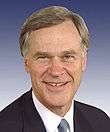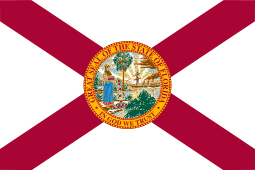Republican Party of Florida
Republican Party of Florida | |
|---|---|
 | |
| Chairperson | Blaise Ingoglia |
| Senate leader | Bill Galvano |
| House leader | Dana Young |
| Founded | 1867 |
| Headquarters |
420 E. Jefferson Street Tallahassee, FL 32301 |
| Ideology |
Conservatism Fiscal conservatism |
| National affiliation | Republican Party |
| Colors | Red, white |
| Seats in the Upper House |
26 / 40 |
| Seats in the Lower House |
80 / 120 |
| Website | |
|
www | |
The Republican Party of Florida (Florida GOP) is the official organization for Republicans in the state of Florida.
History
Several of Florida's governors and U.S. senators were Republican after the Civil War during the Reconstruction era. Afterwards, Florida's state politics were largely dominated by Democrats until Richard Nixon's Southern Strategy, which took advantage of white objections to the advances of the American Civil Rights Movement resulted in a regional political realignment for the south.
In 1967, Claude R. Kirk, Jr. was the first Republican governor elected in the state since the 19th century reconstruction era. And after Nixon's victory in 1968, the state only voted Democratic in presidential elections in 1976 (Jimmy Carter) 1996 (Bill Clinton), 2008 and 2012 (Barack Obama). The presidential election in 2000 was decided by a margin of 537 votes out of approximately 6 million cast, giving George W. Bush the presidency over Al Gore.
The Florida Senate was still dominated by Democrats until 1992, when a majority of Republicans was elected. The Florida House of Representatives turned Republican after the November 1996 election. Since then, the number of Democrats in both chambers have continued to drop.
The Florida Legislature became the first legislature in any of the states of the former confederacy to come under complete Republican control when the Republicans gained control of the House and Senate in the 1996 election. However, in the 2006 election the Democrats actually gained seats in the State House, the first instance of this occurring since the early 1980s.
The most Republican region of the state is the northern third, which contains the large cities of Pensacola and Jacksonville. The Tampa Bay region is relatively Democratic, although it has become much more competitive in recent electoral cycles. While North Florida and the Panhandle have voted heavily Democratic at the local level, both are solid Republican strongholds in presidential elections.
Current structure and composition
In the 2014 election, the Republican nominee for Governor was Governor of Florida Rick Scott. He defeated the Democratic nominee, who was the Former Governor of Florida Charlie Crist.
The current Chairman of the Republican Party of Florida is Blaise Ingoglia, a newly elected member to the Florida House of Representatives, who was elected by RPOF members in January 2015, ousting Scott-favorite and then-RPOF Chairwoman Leslie Dougher.[1]
The Republican National Committee (RNC) is responsible for promoting Republican campaign activities. It is responsible for developing and promoting the Republican political platform, as well as coordinating fundraising and election strategy. Senator Mel Martinez of Florida is the Republican Party's former General Chairman. Reince Priebus is the current Chairman of RNC. The chairman of the RNC is chosen by the President when the Republicans have the White House or otherwise by the Party's state committees. The RNC, under the direction of the party's presidential candidate, supervises the Republican National Convention, raises funds, and coordinates campaign strategy. On the local level there are similar state committees in every state and most large cities, counties and legislative districts, but they have far less money and influence than the national body.
The Republican House and Senate caucuses have separate fund raising and strategy committees. The National Republican Congressional Committee (NRCC) assists in House races, and the National Republican Senatorial Committee (NRSC) in Senate races. They each raise over $100 million per election cycle, and play important roles in recruiting strong state candidates. The Republican Governors Association (RGA) is a discussion group that seldom funds state races.
Current ideology
The membership of the Republican Party is primarily made up of fiscal conservatives, social conservatives, neoconservatives, and members of the Religious Right.
The Republican Party is strong on defense and the more socially conservative and economically libertarian of the two major parties in the state of Florida. The party generally supports lower taxes and limited government in some economic areas, although it does support government intervention in other areas.
Economic policies
Most Republicans favor free-market policies supporting business, economic liberalism, and limited regulation as the best means of fostering economic prosperity. As such, most Republicans tend to ascribe to Reaganomics, an economic theory that was popularized by Ronald Reagan which holds that reduced income tax rates increase GDP growth and thereby generate more revenue for the government from the taxes on the extra growth. "A rising tide raises all boats". Opposition to the increases in the minimum wage stems from counterproduction on the economy- minimum wage increases unemployment and discourages business.
While most Republicans believe that the private sector is more effective in helping the poor than government, they nonetheless generally agree that there should be a "safety net" to assist the less fortunate. Rather than involve the government in the distribution of aid, however, many Republicans support giving government grants to faith-based and other private charitable organizations to supplant welfare spending. Additionally, most Republicans believe that limits on eligibility and benefits must be in place to ensure the safety net is not abused.
Members of the Republican party are generally opposed to a single-payer universal health care system, such as that found in Canada or in most of Europe, sometimes referring to it as "socialized medicine" and are in favor of the current personal or employer based system of insurance, supplemented by Medicare for the elderly and Medicaid, which covers approximately 40% of the poor.[2]
Republicans are generally opposed by labor unions and have supported various legislation on the state and federal levels, including right-to-work legislation and the Taft-Hartley Act which gives workers the right not to participate in unions, as opposed to a closed shop which prohibits workers from choosing not to join unions in workplaces.
Social policies
Most of the GOP's national and state candidates oppose abortion on religious or moral grounds, oppose the legalization of same sex marriage, and favor faith-based initiatives. Most of the GOP's membership favors capital punishment and stricter punishments as a means to prevent crime. Republicans generally strongly support constitutionally protected gun ownership rights.
Most Republicans support school choice through charter schools and education vouchers for private schools; and many have denounced the performance of the public school system and the teachers' unions. The party has insisted on a system of greater accountability for public schools, most prominently in recent years with the No Child Left Behind Act of 2001.
The social conservatives of the party tend to support voluntary organized prayer in public schools and the inclusion of teaching creationism or intelligent design alongside evolution. Although the GOP has voted for increases in government funding of scientific research, many members actively oppose the federal funding of embryonic stem cell research because it involves the harvesting and destruction of human embryos (which many consider ethically equivalent to abortion), while supporting for applying research money into adult stem cell or amniotic stem cell research.
Controversy
In April 2010, the party began investigating $1.3 million in questionable expenses incurred by a former party staffer, Melanie Phister. From 2006 to 2009, the party gave her an American Express credit card on which she charged the expenses for herself and her colleagues. The expenses included: $40,000 at a London, England hotel; $20,000 for plane tickets for indicted former Florida House Speaker Ray Sansom, his wife and children; $19,000 for the Water Club restaurant in New York; $15,000 for a one-month's stay at a Miami Beach hotel, and, $66,000 for chartered flights. The Republican Party of Florida has hired the accounting firm Alston + Bird LLP to investigate the party's finances, including the questionable credit card expenses.[3][4]
The party issued a September 2009 press release about Obama's planned TV presentation to schoolchildren: "Schoolchildren across the nation will be forced to watch the president justify his plans for government-run health care, banks, and automobile companies, increasing taxes on those who create jobs, and racking up more debt than any other president." Politifact said, "There remains no evidence that Obama intends to discuss the controversial policy issues of health care, banking, the automotive industry, taxes or the national debt during his address to students." [5]
In an October 2008 mailing, the party alleged ""Barack Obama has consistently voted against tougher penalties for criminals." Politifact found that the party had taken selective votes or positions to prop up sensational headlines that are belied by a fuller examination of Obama's record, and found the ad's claim false.[6]
In May 2008, the party claimed in an email that Cuban leader Fidel Castro endorsed Obama. Politifact found that to be false, and added it "…comes off less like a joke and more like an intentional smear."[7]
Symbols and name

The mascot symbol, historically, is the elephant. A political cartoon by Thomas Nast, published in Harper's Weekly on November 7, 1874, is considered the first important use of the symbol.[8] In the early 20th century, the usual symbol of the Republican Party in Midwestern states such as Indiana and Ohio was the eagle, as opposed to the Democratic rooster. This symbol still appears on Indiana ballots.
After the 2000 election, the color red became associated with the GOP although it has not been officially adopted by the party. On election night 2000, for the first time ever, all major broadcast networks utilized the same color scheme for the electoral map: red states for George W. Bush (Republican nominee) and blue states for Al Gore (Democratic nominee). Although the color red is unofficial and informal, it is widely recognized by the media and the public to represent the GOP. Partisan supporters now often use the color red for promotional materials and campaign merchandise.
Lincoln Day, Reagan Day, or Lincoln-Reagan Day, is the primary annual fundraising celebration held by many state and county organizations of the Republican Party. The events are named after Republican Presidents Abraham Lincoln and Ronald Reagan.
Current elected officials
U.S. Congress
U.S. Senate
| U.S. Senators |
|---|
| Marco Rubio, Junior Member of the United States Senate from the state of Florida. |
U.S. House of Representatives

Statewide offices
- Governor: Rick Scott
- Lieutenant Governor: Carlos López-Cantera
- President of the Senate: Andy Gardiner
- Speaker of the House: Steve Crisafulli
- Attorney General: Pam Bondi
- CFO: Jeffrey Atwater
- Commissioner of Agriculture: Adam Putnam
Former Florida Governors and U.S. Senators
Governors
| Former Governors of Florida |
|---|
| Charlie Christ (Elected as a Republican, left party during term) |
| Jeb Bush |
| Bob Martinez |
| Claude Kirk |
| Marcellus Sterns |
| Ossian Hart |
| Harrison Reed |
United States Senators
| Former U.S. Senators from Florida |
|---|
| George LeMieux |
| Mel Martinez |
| Connie Mack III |
| Paula Hawkins |
| Edward Gurney |
| Simon Conover |
| Abijah Gilbert |
| Thomas Osborn |
| Adonijah Welch |
See also
References
- ↑ http://www.tampabay.com/news/politics/stateroundup/new-florida-gop-chair-blaise-ingoglia-the-party-will-be-united/2214266
- ↑ Unsettling Scores: A Ranking of State Medicaid Programs, P. 15
- ↑ Junior Florida Republican staff had $1.3 million charged to party credit card, St. Petersburg Times, April 10, 2010, http://www.tampabay.com/news/politics/stateroundup/article1086335.ece
- ↑ Florida republican party staffer racks up $1.3 million on Amex card, Miami Herald, April 10, 2010, http://www.miamiherald.com/2010/04/10/1572627/fla-republican-party-staffer-racks.html
- ↑ http://www.politifact.com/truth-o-meter/statements/2009/sep/02/republican-party-florida/republican-party-florida-says-obama-will-indoctrin/ Politfact, 2 Sept 200-
- ↑ http://www.politifact.com/truth-o-meter/statements/2008/oct/27/republican-party-florida/felony-cherry-picking/ Politifact, 27 Oct 2008
- ↑ http://www.politifact.com/truth-o-meter/statements/2008/jun/05/republican-party-florida/castro-not-stumping-for-obama/ Politifact, 5 June 2008
- ↑ Cartoon of the Day: "The Third-Term Panic". Retrieved on 2007-02-21.








